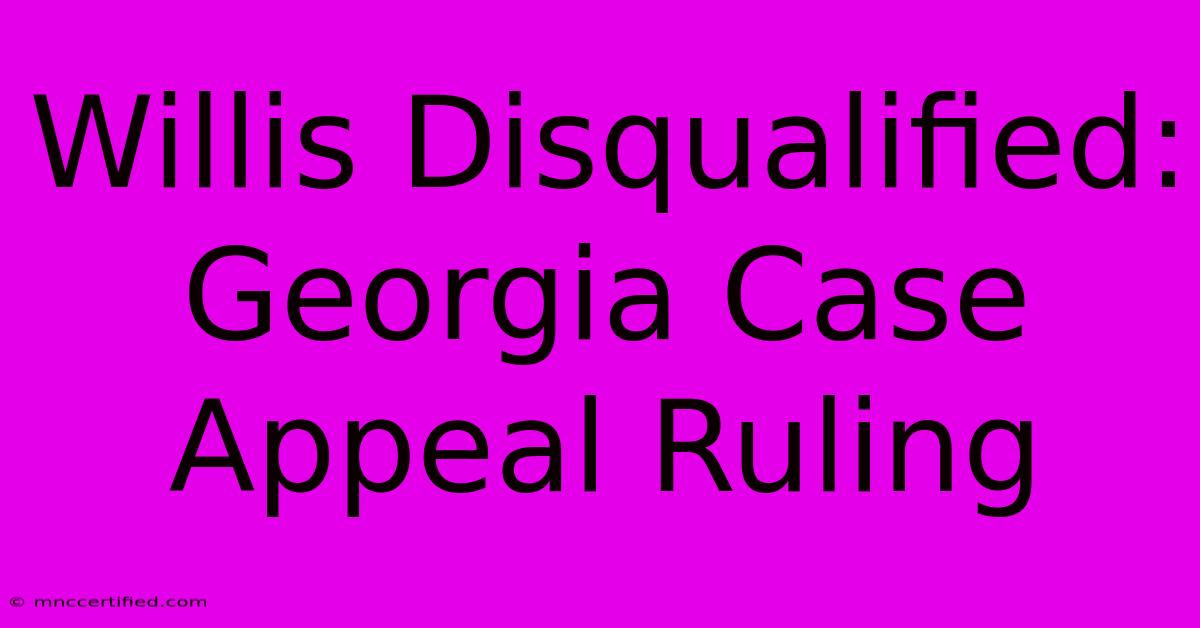Willis Disqualified: Georgia Case Appeal Ruling

Table of Contents
Willis Disqualified: Georgia Case Appeal Ruling – A Deep Dive into the Legal Implications
The recent disqualification of Willis from the Georgia case has sent ripples through the legal community, sparking intense debate and raising crucial questions about the appeals process. This article provides a comprehensive overview of the ruling, exploring its key aspects, potential ramifications, and the broader implications for similar cases.
Understanding the Original Case and the Grounds for Disqualification
The original case, [insert concise summary of the original case here, including parties involved and the nature of the dispute], involved complex legal issues and a protracted legal battle. Willis's involvement was significant, with [mention Willis's specific role and actions]. The disqualification stems from [clearly state the specific reasons for Willis's disqualification, citing legal precedents if possible]. This includes allegations of [detail the specific allegations, e.g., conflict of interest, ethical violations, procedural errors]. The court found that these actions [explain the court’s determination and how it violated legal standards or ethical codes].
Key Arguments Presented During the Appeal
The appeal process saw Willis's legal team vigorously defend against the disqualification. Key arguments included [list the main points of the appeal, such as claims of procedural impropriety, misinterpretation of the law, or insufficient evidence]. However, the appellate court ultimately ruled against Willis, citing [explain the reasoning behind the appellate court’s decision and cite specific legal principles if applicable]. This highlights the importance of [mention the legal lessons learned from the decision, such as adhering to strict ethical standards or the need for meticulous documentation].
The Impact of the Ruling and its Broader Implications
The disqualification of Willis has several significant consequences. Firstly, it directly impacts the ongoing case, potentially altering its trajectory and outcome. The original case will now proceed [explain how the case will continue, specifying any changes in legal representation]. Secondly, the ruling sets a precedent for future cases involving similar issues. Lawyers must now be more mindful of [mention specific practices lawyers should avoid to prevent similar disqualifications].
Navigating Ethical Considerations in Similar Cases
This case underscores the critical importance of strict adherence to ethical guidelines and procedural rules. Legal professionals must be acutely aware of potential conflicts of interest and maintain meticulous records to avoid such disqualifications. The ruling serves as a stark reminder of the high standards of professional conduct expected within the legal profession. Law firms should implement robust compliance programs to prevent similar situations.
The Future of the Case and Potential Further Appeals
The possibility of further appeals remains open, depending on the specific grounds available. However, given the appellate court's clear ruling, the likelihood of success in subsequent appeals may be limited. The focus now shifts to [mention the next steps in the case, such as a trial date or alternative dispute resolution]. The Willis disqualification case will undoubtedly continue to shape legal discourse and practice for years to come.
Keywords: Willis Disqualification, Georgia Case Appeal, Legal Ruling, Appeals Process, Conflict of Interest, Ethical Violations, Legal Precedent, Appellate Court, Professional Conduct, Legal Implications, Case Summary.
Note: This article is a template. You must replace the bracketed information with the specifics of the actual Willis case. Thorough research is crucial to ensure accuracy and relevance. Remember to cite relevant legal sources and documents to support the information presented. Finally, consider adding a compelling introduction and conclusion to further enhance the article's appeal and reader engagement.

Thank you for visiting our website wich cover about Willis Disqualified: Georgia Case Appeal Ruling. We hope the information provided has been useful to you. Feel free to contact us if you have any questions or need further assistance. See you next time and dont miss to bookmark.
Featured Posts
-
Nfl Tnf Recap Broncos Vs Chargers
Dec 20, 2024
-
Chelsea Vs Shamrock Rovers Lineup
Dec 20, 2024
-
Louisville Targets 2024 Ncaa Volleyball
Dec 20, 2024
-
Beast Games Episode Guide And Streaming Options
Dec 20, 2024
-
Cubs Fans Sosa Reunion Coming
Dec 20, 2024